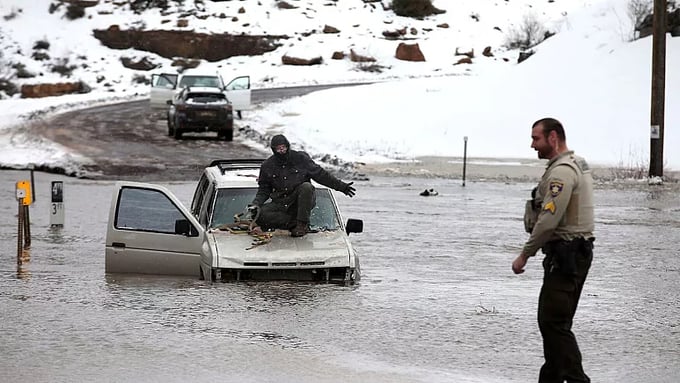May 28, 2025 | 11:08 GMT +7
May 28, 2025 | 11:08 GMT +7
Hotline: 0913.378.918
May 28, 2025 | 11:08 GMT +7
Hotline: 0913.378.918

El Niño can cause flooding in parts of the south east US. Photo: AP
The world could face an extreme El Niño later this year.
The term refers to a global weather phenomenon where waters in the Pacific Ocean become much warmer than average.
According to new analysis by Australia's Bureau of Meteorology, seven different predictive models suggest that sea surface temperatures will cross the El Niño threshold by August.
"There is approximately a 50 per cent chance of El Niño in 2023," the BOM warns.
The climatic event could have drastic effects from searing heatwaves to stronger storms.
Here’s how climate scientists predict El Niño will affect global temperatures, weather and marine life.
What is El Niño?
The El Niño climate event is responsible for raising global temperatures and aggravating extreme weather events.
It is caused by ocean temperatures and winds in the Pacific that oscillate between warming El Niño and cooling La Niña.
This year is already predicted to be hotter than 2022 and the fifth or sixth hottest year on record.
The effects of El Niño take months to be felt and may mean 2024 breaks temperature records.
How does El Niño affect the weather?
El Niño pushes warm water in the Pacific Ocean eastwards, causing the Pacific jet stream to move south of its neutral position.
This produces dryer and warmer weather in northern USA and intense rainfall and flooding in the US Gulf Coast and Southeast.
In Europe, it can lead to colder, drier winters in the north and wetter winters in the south.
During the phenomenon, the global temperature increases by around 0.2 degrees Celsius, according to the National Oceanic and Atmospheric Administration (NOAA).
This could mean breaking the crucial 1.5 degrees Celsius global warming limit.
“The probability of having the first year at 1.5 degrees Celsius in the next five-year period is now about 50:50,” Professor Adam Scaife at the UK Met Office told the Guardian.
As a result, the world will face more intense heatwaves, prolonged hot seasons and more powerful storms.
Indonesia and Australia will likely experience hotter and drier weather with a greater possibility of wildfires.
Monsoons in India and rains in South Africa might be reduced while east Africa could get more rains and flooding.
El Niño also increases hurricane activity in the Pacific meaning places like Hawaii will be at risk of tropical cyclones.
How does El Niño affect sea life?
El Niño also endangers marine life along the Pacific Coast. In normal conditions, a phenomenon known as 'upwelling' brings cool, nutrient-rich water up from the ocean depths.
When El Niño occurs, this process is suppressed or halted completely. This means fewer phytoplankton along the coast resulting in less food for certain fish.
In March, scientists found that global sea surface temperatures were at a record high. El Niño is likely to exacerbate the situation.
Warmer water causes bleaching in coral reefs leaving them at greater risk of starvation.
(ERN)

(VAN) Vikas Rambal has quietly built a $5 billion business empire in manufacturing, property and solar, and catapulted onto the Rich List.

(VAN) Available cropland now at less than five percent, according to latest geospatial assessment from FAO and UNOSAT.

(VAN) Alt Carbon has raised $12 million in a seed round as it plans to scale its carbon dioxide removal work in the South Asian nation.

(VAN) Attempts to bring down the price of the Japanese staple have had little effect amid a cost-of-living crisis.

(VAN) Fourth most important food crop in peril as Latin America and Caribbean suffer from slow-onset climate disaster.

(VAN) Shifting market dynamics and the noise around new legislation has propelled Trouw Nutrition’s research around early life nutrition in poultry. Today, it continues to be a key area of research.

(VAN) India is concerned about its food security and the livelihoods of its farmers if more US food imports are allowed.